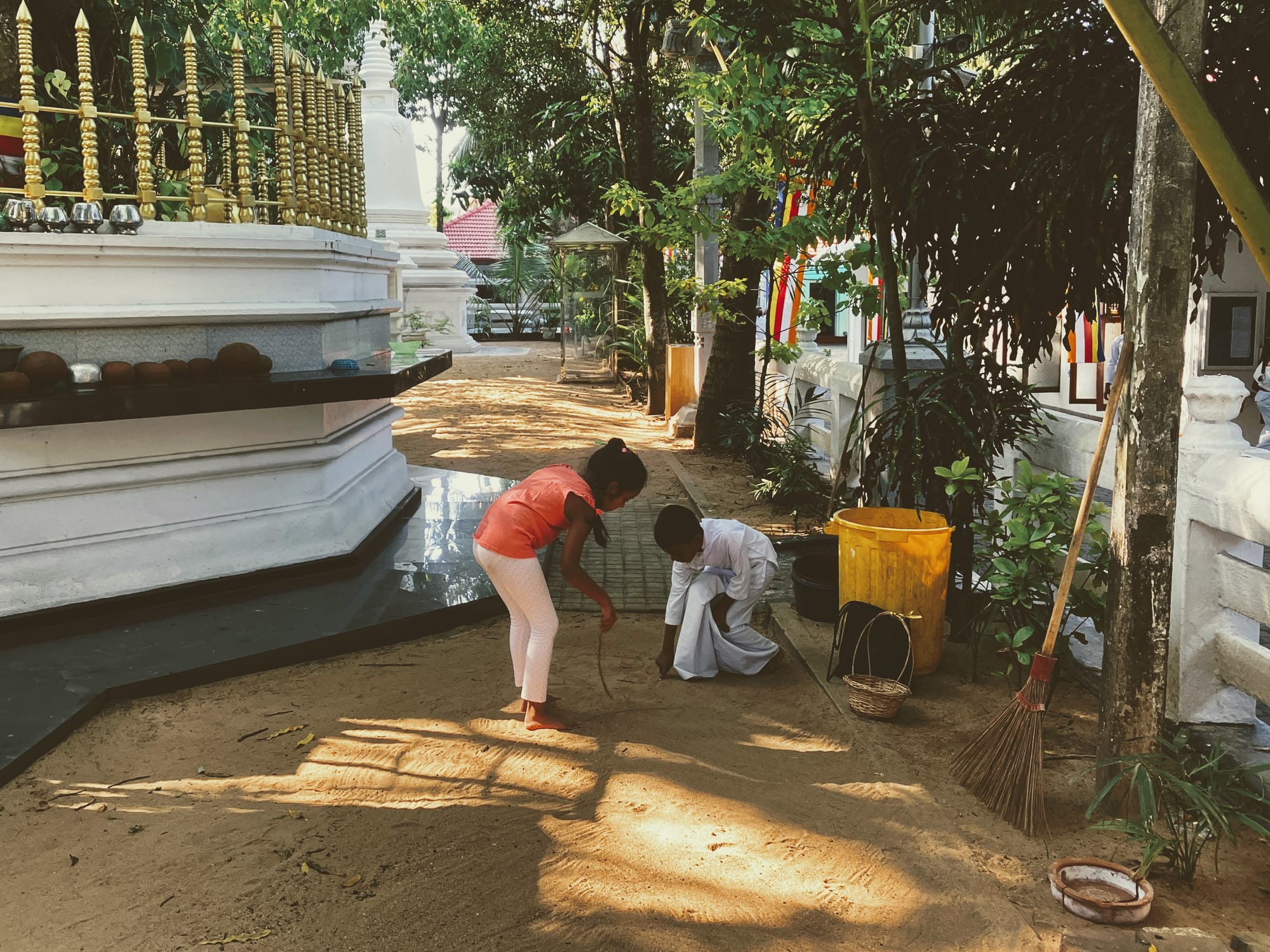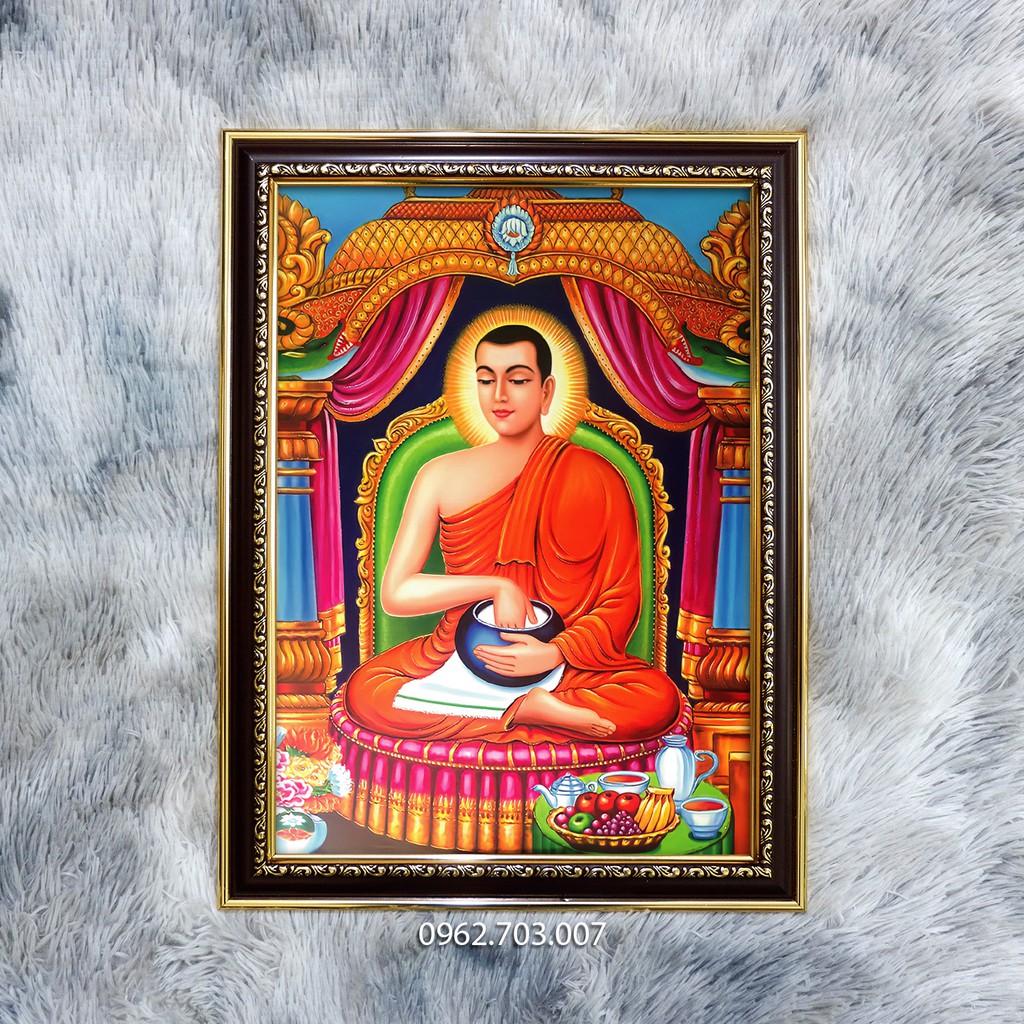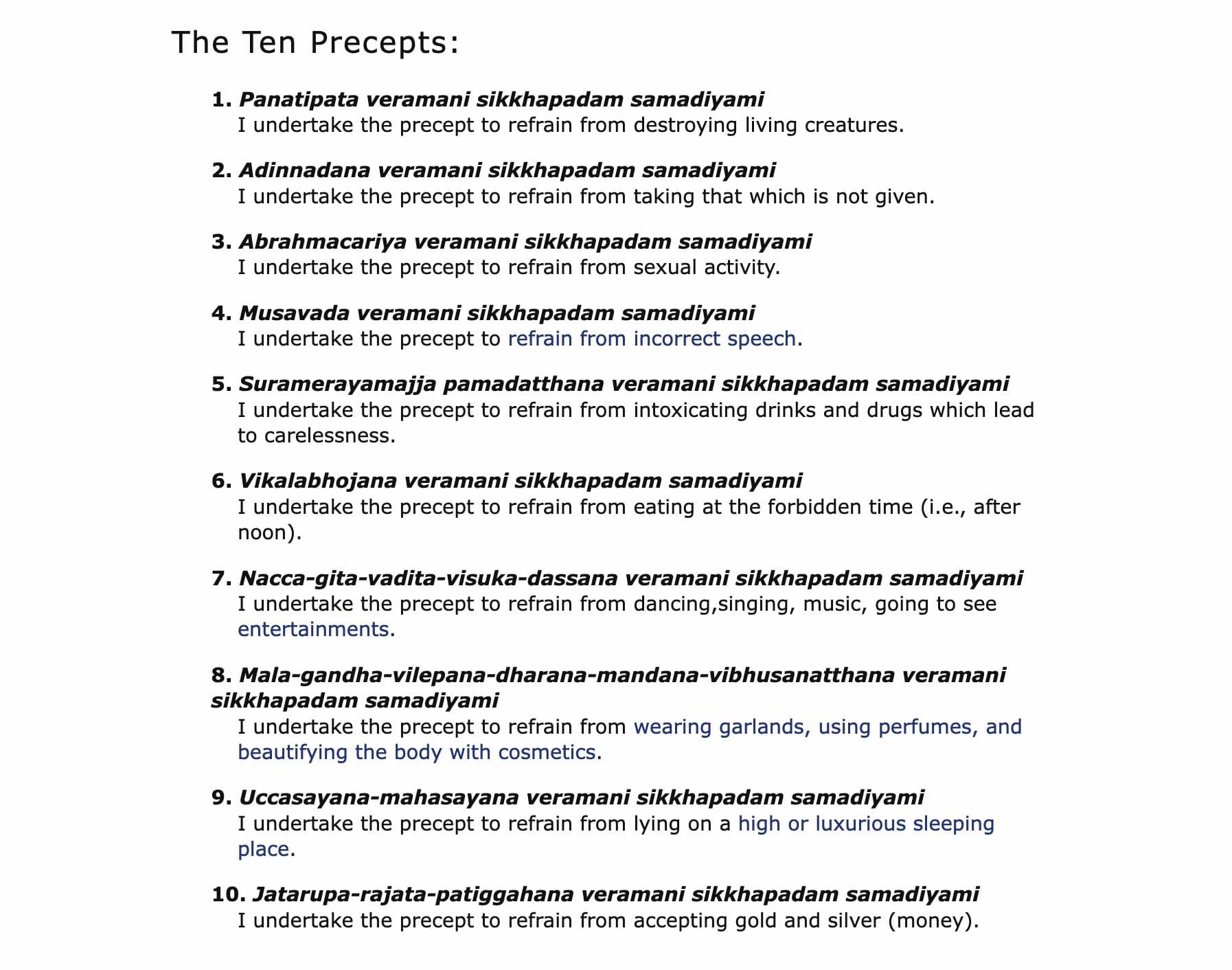Being Buddhist For A Day
Keeping the 10 precepts, and failing

Today is Poya. A full moon day. Poya is a public holiday in Sri Lanka and you can do nothing, but you're supposed to do a very specific sort of nothing. For a day at least, Buddhists are supposed to try and be Buddhist. So I've been trying.
Going To Temple
The Buddha's path is clearly a monastic path, going from home to homelessness. Most people are putting that off for another life, including myself. On Poya, however, lay people live like a monk for a day at least, keeping the ten (or eight) precepts, which we'll discuss later. The first thing is to get to where the precepts are kept, the 'village' temple.
Thus first thing is to get my recalcitrant children out of the house. They actually like going to temple, but they don't like going to temple. They whinge the whole way, even though we're only going like 500 meters. Everyone's supposed to wear white but I'm happy to just get them out of the house without anyone seeing red. Before we go, we gather flowers to give the Buddha, to remind ourselves of impermanence. We gather the pink araliya flowers that fall next door, and some blue flowers that grow over the well, and the white flowers that aren't jasmine from the neighbors. The kids fight over the one basket and I have to go back in to get another one. To remind myself of impertinence.
As we walk down the road, my daughter is giving me the pook face, but I ignore her. She's seven going on seventeen and this is my life now, I guess. We're trying a new temple today and the first one doesn't exist, but there's another 200m down the road, and the usual 200m further if that doesn't work. But it does. It's a relief cause it's always a relief walking into a temple.
Temples are palpably cooler than the street, they smell better, and they're beautiful. Almost every temple is shaded by a big Bodhi Tree—a sapling of the tree that shaded the Buddha—and this one is no exception. We can smell the incense and take off our shoes to walk in the sand. A little boy is cutting daham pasal ('Sunday' School) and he 'shows us around'. He leads us down some dead-end alley behind a house where a monk yells at us and then laughs. My mother says this child was obviously too naughty for daham pasal and now we're naughty by association.
We offer flowers to the Buddha, next the milk rice and tea he has already been given. We pay our respects to the Hindu Gods who are honored in every Buddhist temple I know. Usually Vishnu, and often Kataragama, Shiva's son. Then the daham pasal class ends and the children show my children how to water the Bo Tree, walking seven times around it first. My mother starts sweeping the sand, which is a meditation in itself, and my children try to copy her, in their own mindless way. I'm happy because they're happy. The seed is in their heads. Whether it flowers or not is beyond my ken, and also not my intention.
Whatever 'being' a Buddhist is, it's impermanent. I'm simply passing on what my mother passed to me, and hers to her, and so on for thousands of years. I don't think any of us have escaped the cycle of rebirths yet, but at least we can show our children the exit.

Stories On The Way Home
Then we walk back home, through 'the city'. We pass a man selling books and religious holograms. I buy an image of Seevali Thero, who superficially looks like the Buddha, but who is not. I see his image everywhere but know little about him. Seevali Thero his hand in an alms bowl and Amma says he's known for always for having food around. Seems relevant. I give the man a thousand rupees and he looks at me with surprise and what I can only describe as poignant sadness. I feel terrible. Seevali's spirit is sorely lacking in my country, where so many people go hungry so that foreign usurers may collect interest. I have wealth mainly by luck of birth and marriage, and I can't help but feel that I'm blowing my karma in one regeneration.
Later I read about Seevali Thero's story. Apparently he was once a king that caused a famine during a siege. He was reborn in torment and barely came back to Earth at all, his mother was simply unable to deliver until the Buddha came to bless them. Thus he was finally reborn blessed, and his presence blessed the whole kingdom with plenty. The only plenty that ultimately matters, plenty of food. I put his hologram on my fridge, and think of all the people being starved today, under sieges, sanctions, and 'structural adjustments'. May he be with them. Gods know the ruling powers on Earth have attacked them. May those bad kings get their comeuppance, in this life or the next.
We also buy a kids book which my Amma (their Achchi) reads to them, with some edits. It's a Jataka Story (about the Buddha's past rebirths). This one is about a fox who pretends to take sil every day, ie to behave like a Buddhist. The first precept is to not destroy living creatures, ie to not eat meat, so this is theoretically a fox to be trusted around mice. But the mice notice their kind slowly disappearing and then… At this point, my mother trails off. What is it? What is it? Well, apparently the mice get together and eat the fox, down to the bones. The last mice into the pile find nothing left. The fox is simply dissolved into their retribution of teeth. One wonders when the mice of this world will get together, to finally destroy the foxes who constantly lie to us about human rights and freedom.
As brother Malcolm X said in his own fox story, “The white liberals are foxes, who also show their teeth to the Negro but pretend that they are smiling. The white liberals are more dangerous than the conservatives; they lure the Negro, and as the Negro runs from the growling wolf, he flees into the open jaws of the “smiling” fox.” Ain't it the same thing, over and over again?
The 10 Precepts (Dasa-Sila)
This is all a roundabout way of getting to the actual practice of Poya, which keeping the ten precepts. As you can see, Buddhism is not an isolated philosophy. It's encoded in many cultures, distributed across the consciousness of any different populations. I, for example, didn't really know what the precepts are, I had to look them up for the article. I know you're supposed to wear white (not actually a precept), not eat meat, not eat after noon, and generally be on your best behavior, but this is only part of it. Luckily there's a whole culture to carry me.
These are the actual precepts, if you're interested. I include the Pali for my (Tamil Christian) wife, who can sorta read it. Via Access To Insight:

Despite trying, I have failed at almost 100% of this today. I killed at least a dozen mosquitos and flies and, in fact, spent at least 10 minutes trying to kill one in the bathroom. I watched a pirated movie with my children, thus breaking precepts 2 and 7 at the same time. I said 'what the hell' in front of my children at least a few times, and they pointed it out to me. I had coffee but successfully avoided drinking with my father-in-law, which was difficult; I'd normally be three whiskies in at this point. I had to eat after noon cause that's when lunch was served, and I sat on a chair so as not to look absurd. I guess I managed to avoid wearing perfume or having sex, but two (and a bunch of halves) out of ten is pretty terrible.
What I half did was avoid eating meat (which I usually do), and mostly avoided sitting on chairs, which was actually quite enlightening. I just sat on the floor all day, which meant spending a lot of time with animals, and literally having a different perspective. I'm awkwardly sitting on the floor right now, as I'm writing this.
Culturally, Sri Lanka has a thing about literal levels. I would never sit next to a monk, you always sit at their feet. I always bowed at my grandmother's feet. At the same time the maids generally sit on the floor or stand around us and the children, as much as I tell them not to. I don't try that hard, because I've discovered that messing with cultural practices I don't understand often makes things worse for everybody. Every culture has a hierarchy and superficially pretending that people are equal is not equality. Where I grew up, in America, people have this superficial sense of equality, but it belies the most violent, hypocritical, and globally pervasive hierarchy. Americans have their servants in other countries, or as 'illegals', or hidden inside apps and factories. They drown them at the borders or drone them from above, but they'll superficially sit at the same table if they ever get near, which they structurally don't. They still have hierarchy, just with more hypocrisy.
But anyways, I'm sitting on the floor now. Am I going to actually sleep on the floor? Let's see how close we get to midnight.
Being Buddhist
People often say that Buddhism is a philosophy and not a religion, but I don't understand this. Even the concept of a difference between the two things is confounding. I vaguely knew Buddhist philosophy for years before meditating properly, and I knew nothing. The basic practice of meditation is clearing your mind of all words, hardly the basis for analytic philosophy.
At the same time, I would have never got to those few precious seconds of 'nothing' without 2,400 years of ritual and culture, ie religion. The religious 'extras' that I used to look down upon were, in fact, what raised me. They're how I pass this information onto my children. The 'religion' of Buddhism is parents and children and monks and lay people all carrying out a bunch of ritual operations that they may not understand, but which nonetheless run the 'program' of Buddhism. And isn't this what all religions do? Sustain a higher consciousness, across a bunch of human brains? Who says religion and philosophy are separate? This very concept would have confounded and probably annoyed the ancients.
Being Buddhist, in Sri Lanka at least, isn't following a philosophy. The philosophy is there, but it's very much a practice. There's a lot of things that don't make 'sense', but that's like saying a squiggle to represent '2' doesn't make sense, or the programming term 'printf' doesn't make sense. I mean, I guess, but the point is what you do with the symbol, not the symbol itself. Ritual is just the original symbol manipulation. It's how you 'run' a higher consciousness across a networked human population. Pompously questioning the individual commands—like not using chairs when there's a full moon—is honestly nonsense. What are we even talking about? We're using guttural ape grunts and literal handwaving to encode reality, and then questioning which grunts and motions are more 'real'. It's all illusion. Some illusions are just (temporarily) useful.
The point of religions is really what they do (ie, the type of person they make) and not literally what they say. People trying to debate religions on points are missing the point entirely. People trying to cleave Buddhism from other religions are missing how it's actually practiced. In Sri Lanka it's very much a faith, especially for lay people who are not going the monastic way.
I'm kinda talking to myself here because I once thought the same way. I thought the 'pure' Buddhism was just meditation, and everything else was irrelevant cultural accumulation. When I 'became' Buddhist I told my Achchi and she asked me what color the Buddhist flag was. What a silly, irrelevant question, I thought. But that was hubris. The information I needed was encoded in the ritual of bowing to her, but I was proud and just going through the motions. I literally would not even know about Buddhism is it hadn't been preserved in such ways, for generations, especially by her. Though the Buddhist flag was new, the practice is old, and the culture is wiser than any individual components. None of us are Buddha, but we are Buddhists, which is an attempt to run the programming of one transcendent brain atop millions of wholly inadequate ones. Does it work? I mean, not yet. But it's working. We're still waiting for the next Buddha, but—day by day—we can be better Buddhists. Like werewolves, Buddhists are supposed to come out at least one day a month. On a full moon. On Poya day.